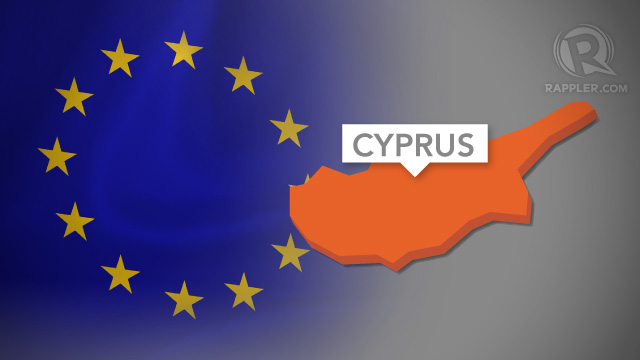SUMMARY
This is AI generated summarization, which may have errors. For context, always refer to the full article.

(UPDATED) NICOSIA, Cyprus – Cypriots stayed calm as banks reopened on Thursday, March 28 after a nearly two week lockdown, with tight capital controls stopping customers from draining the island’s coffers after its eurozone bailout.
President Nicos Anastasiades tweeted his thanks to the people of the eastern Mediterranean island for their “maturity” after they formed orderly queues to access banks that had been shuttered since March 16.
As the feared bank run failed to happen, the cabinet appointed a panel to investigate whether criminal activity led to the Cyprus meltdown, while the president said he was cutting his salary by a quarter.
World markets were largely up on the apparent success of the first capital controls ever used by a eurozone economy — a contrast to the chaos that surrounded the 10-billion-euro ($13-billion) EU-IMF bailout.
Peaceful
Dozens of people lined up outside bank branches in Nicosia then filed inside eight at a time when bank doors finally swung open at 12:00pm (1000 GMT), while security guards posted outside most branches found they had little to do.
Banks were handing customers lists of the controls including a daily withdrawal limit of 300 euros ($385), a ban on the cashing of cheques and orders not to take more than 1,000 euros out of Cyprus.
But some customers were even making deposits.
“There is confidence, everything was fine,” unemployed electrician Philippos Philippou told AFP as he emerged from a branch of Laiki bank, which will be wound up under the bailout.
Five shipping containers reportedly filled with billions of euros were delivered to the central bank late Wednesday, guarded by a helicopter and police cars.
The Cyprus stock exchange remained closed.
Critical time
Officials had said the capital controls were needed to prevent further damage to the fragile Cypriot economy, which is heavily dependent on a banking sector bloated with Russian money.
But after the banks reopened, Anastasiades, who was only elected one month ago, gave “sincere thanks and deep appreciation” to Cypriots for not panicking at a “critical time” for the economy.
“The attitude of maturity and responsibility the people have demonstrated today, going to bank branches, sends a clear message of optimism and certainty for the future and to those who have been watching events internationally,” he said in a statement.
Salary cuts
Anastasiades had decided to cut his own salary by 25 percent, while cabinet members will take a 20 percent reduction and all of them will give up the 13th month salary that they are entitled to, a presidential aide said.
The cabinet has also appointed three ex-supreme court judges to probe whether there are “criminal, civil and political responsibilities” involved in the meltdown, presidential undersecretary Constantinos Petrides said.
But while the deal agreed in Brussels on Monday kept Cyprus from crashing out of the euro, the promise of years of future hardship has sparked protests at home against its European partners.
German Finance Minister Wolfgang Schaeuble said Thursday he understood Cypriot anger but added: “That will pass. It is of course completely unfounded.”
Cyprus must raise 5.8 billion euros to qualify for the full 10-billion-euro loan from the “troika” of the European Union, European Central Bank and International Monetary Fund.
Depositors with more than 100,000 euros in the top two banks — Bank of Cyprus (BoC) and Laiki or ‘Popular Bank’ — face losing a large chunk of their money.
Laiki will effectively wound up and absorbed by the bigger bank.
‘Worse days’
Finance Minister Michalis Sarris said on Wednesday that Cyprus “will see worse days in 2013.”
Cyprus is the first eurozone country to impose capital controls after bailouts — unlike Greece, Spain, Portugal and Ireland, which have also received rescue packages.
As well as raising concerns that other countries could face similarly harsh bailouts in future, the move has raised fears that it could effectively create “two euros” as euros trapped in Cyprus are effectively worth less.
But the EU said on Thursday there was “a matter of overriding public interest” in imposing the controls.
European stocks mostly climbed and US stocks opened up Thursday amid the unexpectedly peaceful bank opening, although Asian markets mostly fell and the euro dipped versus the dollar. – Rappler.com
Add a comment
How does this make you feel?
There are no comments yet. Add your comment to start the conversation.